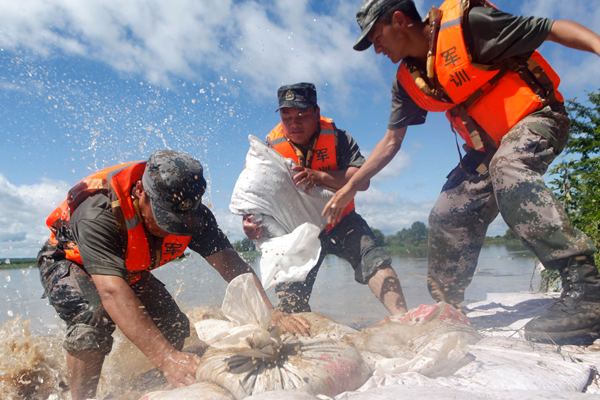Northeast China braces for major floods
Northeast China is expected to experience its biggest floods in two decades this year due to continuous heavy rain along the region's major rivers, flood control authorities have warned.
Rainfall along the Songhua River since June is about 40 percent more than the average for the same period in previous years. This year's rainfall total along the river is higher than before the huge flood of 1998, the State Flood Control and Drought Relief Headquarters said over the weekend.
 |
|
Soldiers stack bags of sand on Sunday after floodwaters in Heihe, Heilongjiang province, broke an embankment in the city's Beitaozi Island. Heihe is suffering its most severe flooding in 30 years. Wei Jianshun for China Daily |
Areas fed by the Songhua River are highly likely to have rain-related flooding in mid to late August, it said.
Meanwhile, the Nenjiang River has also been swollen by heavy rain this summer. The total rainfall since June along the Nenjiang has been 30 to 40 percent more than in previous years, Yang Guangyun, an official with the Heilongjiang provincial hydrology bureau, was quoted as saying by China Central Television on Sunday.
The water level in Nierji Water Complex, the biggest hydro project in the main stream of the Nenjiang River, has passed its warning level, according to the report.
CCTV aerial footage on Sunday showed that all houses, farmland and roads in the flood area were submerged.
In the worst-hit Liuhe county in Heilongjiang province, more than 60,000 hectares of crops, including corn, soybeans, and potatoes, are all soaked in water, the report said.
In Heilongjiang province, the part of Heixiazi Island belonging to China has been submerged due to continuous downpours, with about 90 percent under water on Sunday, according to the Xinhua News Agency.
The island, which is shared by China and Russia, is located at the confluence of the Amur River in Russia, and the Ussuri River. The entrance to the island has been closed by border police from Jiamusi as only a few buildings can be seen above the water. All construction projects on the island have been suspended, and more than 300 workers have been evacuated.
By Friday, pounding rain in Heilongjiang and Jilin provinces, as well as the Inner Mongolia autonomous region, had caused flooding and affected 2.28 million people, according to the State Flood Control and Drought Relief Headquarters.
Floods have ruined 1.07 million hectares of crops and plants, resulting in direct economic losses of 6.6 billion yuan ($1.08 billion), according to the headquarters.
From Sunday to Tuesday, North China, eastern parts of Northwest China, as well as parts of Southwest China's Sichuan Basin and Yunnan province will see modest to heavy rainfall, with some areas experiencing torrential rain, the National Meteorological Center said on Sunday.
Some of these regions will be swept by brief thunderstorms, gusts and hail, it said.
The State Flood Control and Drought Relief Headquarters predicted in July that heavy rainfall might cause severe flooding in many major rivers from July 15 to Aug 15, including the upper reaches of the Yangtze, Haihe, Yellow, Songhua and Liaohe rivers.
"For instance, there hasn't been a severe flood in the Songhua River since 1998. Therefore, many cities in North China don't have much experience in flood control," Shu Qingpeng, press secretary of the headquarters said in July.
He alerted local government authorities to help residents improve their awareness of emergency procedures during natural disasters.





















